66. A letter to Terry ✒️ #12
Linguistic learnings, and is it cock-a-doodle-doo or cock-a-doodle-don’t?
Dear Terry,
Before I start this letter in earnest I’d just like to express my deep gratitude for your supply of the sunshine which in the closing paragraph of my last letter I’d begged for you to send. The van requires no lining in bubblewrap, nor do I need to up-tog my sleeping bag after all. Spring has at last sprung!

Thank you for your latest letter, which at very first glance had appeared more sales pitch than considerate correspondence. Yet I found myself reading with growing interest the detailed breakdown of your Advanced Drivelling course, pausing only to research certain key points of the curriculum.
In reading the course description I have for the first time – and not courtesy of Joyce1, but of Freedman – come across the term ‘fronted adverbial’, a label of which I had been previously unware despite my BA (Hons) in German and Linguistics.
I mean, I know what one is – but until I read your letter I’d never looked a fronted adverbial in the face and addressed it by name. I’m pleased for both of us, Terry, that I’m already learning such impressive things as these from the ‘Advanced Drivelling’ syllabus without having yet even enrolled on the course. That’s a win already.
I enjoyed reading the draft of the letter you are proposing to send to Messrs Khan and Sunak – Mayor of London and Prime Minister, respectively – on the subject of potholes. I wonder where this one in Oswestry, Shropshire – reported by The Sun to measure 26ft x 50ft, and up to 6ins deep – would land on that beautifully-rendered scale of averages you’d come up with for London?
I take issue with your declaration at the end of your pothole rant draft letter to London’s leaders that ‘…this clearly inevitable state of affairs… is the cause of road rage, anguish and gout…’ Gout, Terry? Are you sure? Trench foot, perhaps, if those choosing to wade through water-filled potholes don’t take care to dry their feet and pop a nice pair of spare socks on afterwards, but not gout, surely? 🤔
I’ve put this compare-and-contrast together for you with the help of Wikipedia:
Gout is due to persistently elevated levels of uric acid in the blood. This occurs from a combination of diet, other health problems, and genetic factors.
Trench foot occurs due to prolonged exposure of the feet to cold, damp, and often unsanitary conditions.
I’ll leave that with you. 👀
It seems that my rural lane, your entire city and a small village in Shropshire are not the only locations for public highways to suffer pothole problems. We were in Bedfordshire for a few days last month and found their attitude towards the rubbish road surfaces on their patch rather refreshing. Terry, up there they are good enough sports to actually warn road users of what they’re about to encounter:
I’m afraid that despite my best intentions to view at least one episode of ‘Star Trek’ since I last wrote to you, I have done no such thing. Instead, I spent my spare time last week out getting lost and doing the crossword – and not even at the same time.
While engaged in the latter I found yet another new-to-me word: this one in the clue for 41 across:
I was minded to look up ‘teeter-totter’ immediately, but then realised that simply working out the solution to the clue would give me the answer I was looking for.
And here it is:
Terry, have you ever heard of a ‘teeter-totter’? Once I’d solved the clue and asked Google what it made of this term, I learned that the word ‘seesaw’ doesn’t even feature in the list of North American children’s playground equipment terminology, because what we call a seesaw is… okay, I’ll stop mansplaining.
I mean, it makes sense though. A seesaw – or teeter-totter – is deliberately unstable: one teeters on it. And ‘totter’, I know, means to move unsteadily. So now I’m wondering why in British English we insist on using the name ‘seesaw’ when ‘teeter-totter’ explains better what the thing actually does?! 🤔
Of course, there are plenty of regional and international language variations to provide opportunities for amusement. On a visit to a local farm near where I lived in Germany my au pair kids thought I’d gone crazy when I replied to a cheerful greeting by the resident cockerel2 with a ‘Cock-a-doodle-doo!’ of my own.
The children fell about laughing, repeating my phrase over and over again.
‘What have I said wrong now?’ I asked their mum in frustration.
She was laughing too. ‘Well, you addressed the creature in English, Rebecca. German cockerels say ‘kikeriki’!
My further research has since revealed that although all cockerels actually speak Chickenese (disclaimer: I didn’t actually research that bit), the name for their call translates into some surprisingly varied words in other languages:
🇫🇷 French: cocorico
🇪🇸 Spanish: quiquiriquí
🇮🇹 Italian: chicchirichi
🇮🇸 Icelandic: gaggalagó
There’s a much more comprehensive list here on omniglot.com, if you’re interested.
And here’s a link to the page that will help you train Willow, Minty and Mocha how to meow comprehensibly to their further-flung feline friends. Let me know how that goes, won’t you?
And Terry, I’ve got some happy news to share! A few weeks ago my parents reported that while they’d been away a pair of wild mallards had taken up residence in their garden, with Mrs Duck having commandeered a corner of the herb garden in which to build her nest. This wasn’t entirely convenient to the humans in the household, one of whom had been keen to be getting her spring planting of herbs underway.
With Mrs Duck down the garden doing a couple of circuits of the pond, Mum had sneaked a look at her nest. She counted eleven eggs.
Weeks passed.
Last week Mum told me that her latest look at the nest while Mrs Duck was doing her laps had revealed that it still contained eleven eggs. ‘If those are the same eggs, she’s been sitting on them for much longer than the time it would have taken them to hatch. They must be addled.’
On Monday afternoon, plans for the horticulture department to continue delaying Project Herb Garden were shelved in favour of a trip to the garden centre. ‘We’ll leave Mrs Duck alone for another couple of days while she comes to terms with her eggs not hatching, but after that I’m going to be planting the tarragon there.’
Then on Wednesday morning I received this iMessage:
Three hours later, this one:
By mid-afternoon there was a nine-strong flotilla of only-just-egg-sized downy ducklings on the pond at the other end of the garden: an extraordinary distance for such tiny feet.
Don’t you love spring, Terry? With these sunny skies and downy ducklings it’s all rather wonderful. I just hope these ones will stick to swimming in ponds, not potholes.

Now, with all those ducklings finally out of the way I wonder if that tarragon’s been planted yet? 🌱
Do write soon, and all the very best,
Rebecca
UPDATE ON THE TEETER-TOTTER VS SEESAW DEBATE!
The brilliant Jill at
has provided very welcome clarification to the teeter-totter vs seesaw debate! This is what she says:'...teeter-totters and seesaws are not the same!! I grew up in America and we had one of each in the garden. The teeter-totter was a suspended swing/see-saw thing that, like the swings, hung from a crossbar but two people could ride it at once while facing each other and swinging back and forth.'
And Reader, you will LOVE this coincidence. Last week when I was looking for an early photograph of me with a hen for last Saturday’s post, I found a snap on the next page of the photo album which showed Teddy Edward, the old friend featured in this post. And in that picture (with Teddy Edward in the left foreground), guess what the not-quite-two-year-old Rebecca is sitting on?
A TEETER-TOTTER!
, am I right?!If you’ve enjoyed reading this letter to Terry, please let me know by clicking the heart. Thank you! My next ‘Dear Reader, I’m lost’ post will be published as usual on Saturday. See you then!
You’ll find the rest of my letters in this series by clicking the ‘Letters to Terry’ tab on the top bar of my home page. Terry and I take it in turns to write to each other on alternate Wednesdays, and I really enjoy our light-hearted correspondence! You can access both Terry’s letters and mine using the index below:
Check out Terry's fabulous newsletter, and to make sure you don’t miss his reply to this letter next week, why not subscribe? You’ll be glad you did!
Last but not least, do please share and subscribe for free! Thank you!
Direct quote from Terry’s last letter: “Of course, this is reminiscent of Joyce’s use of the fronted adverbial”.
No, me neither.
What we call a cockerel over here is what you might call a rooster. 🐓





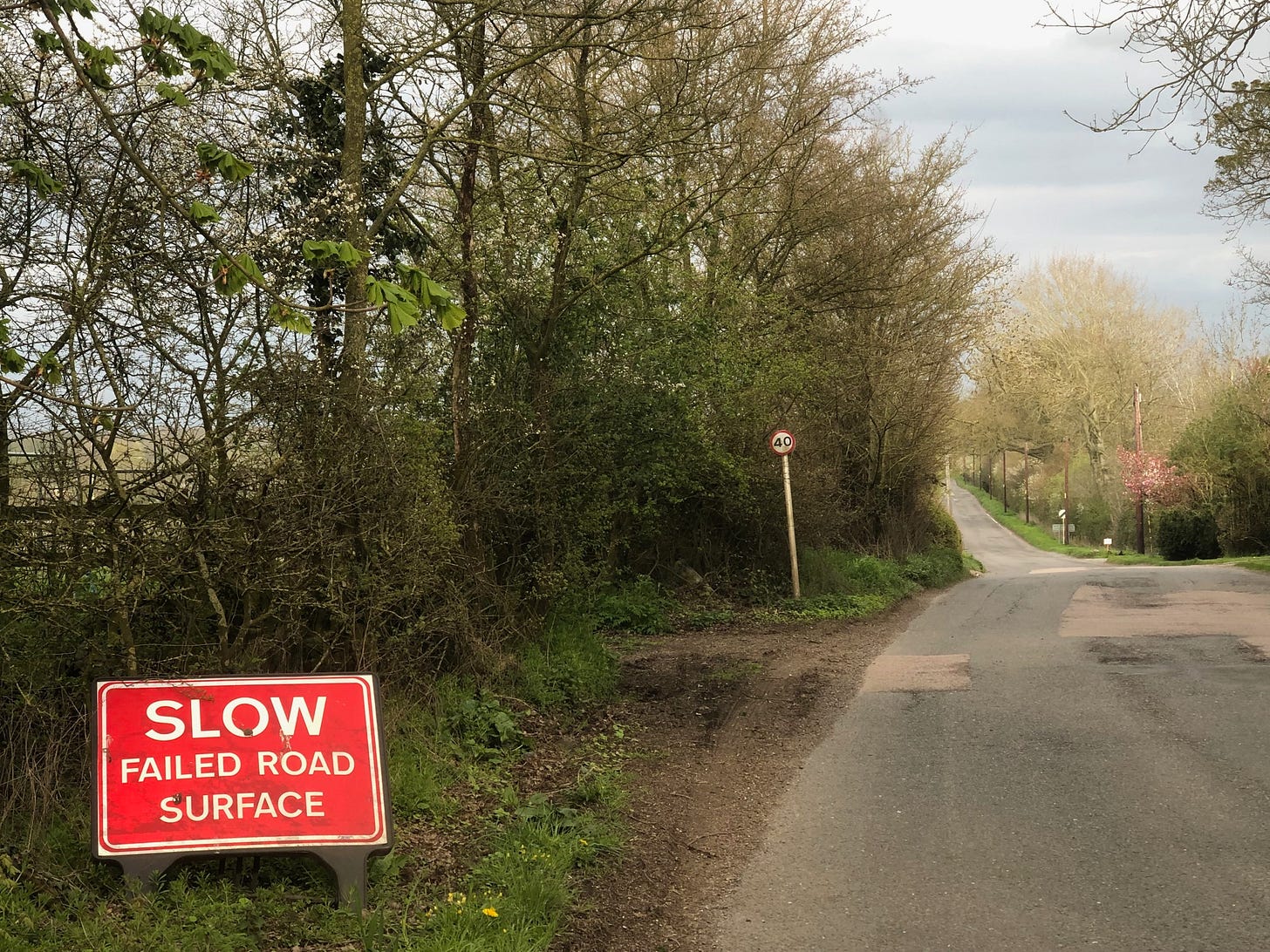




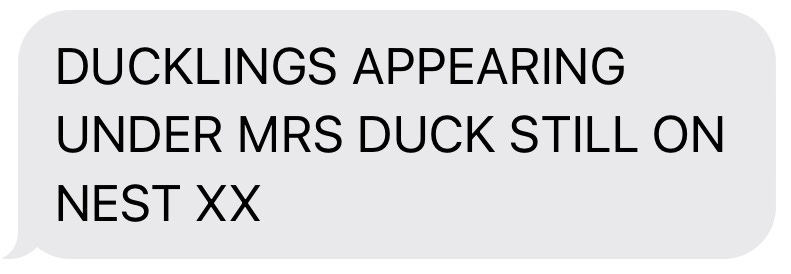
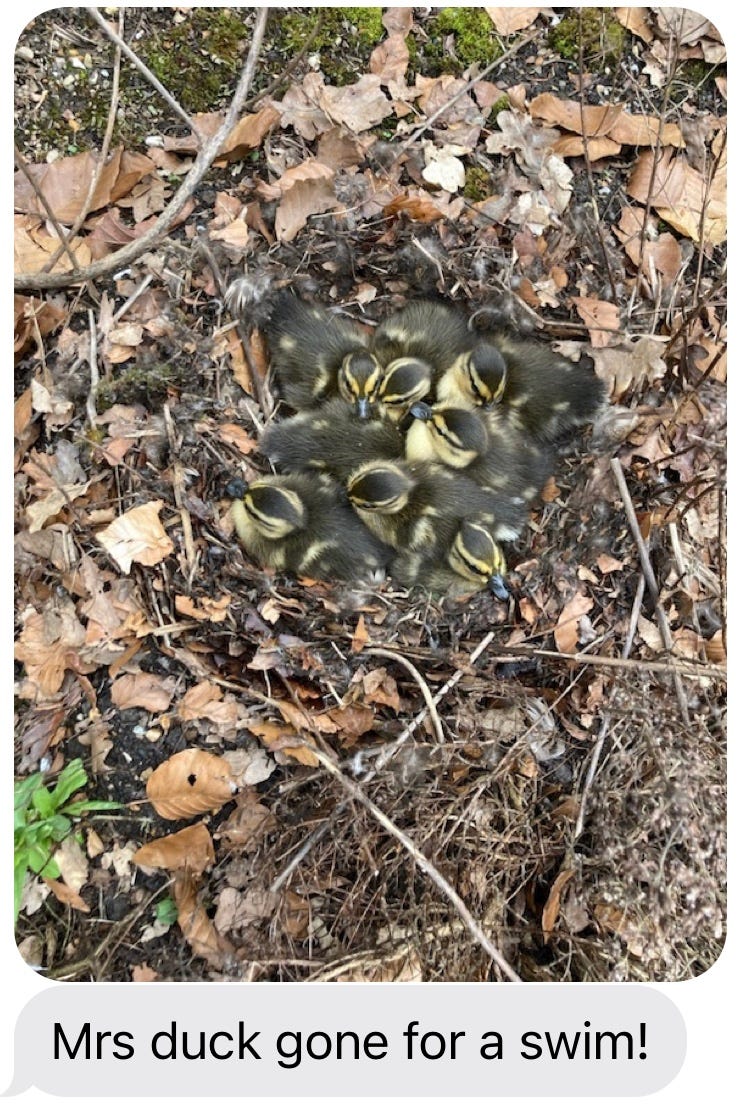
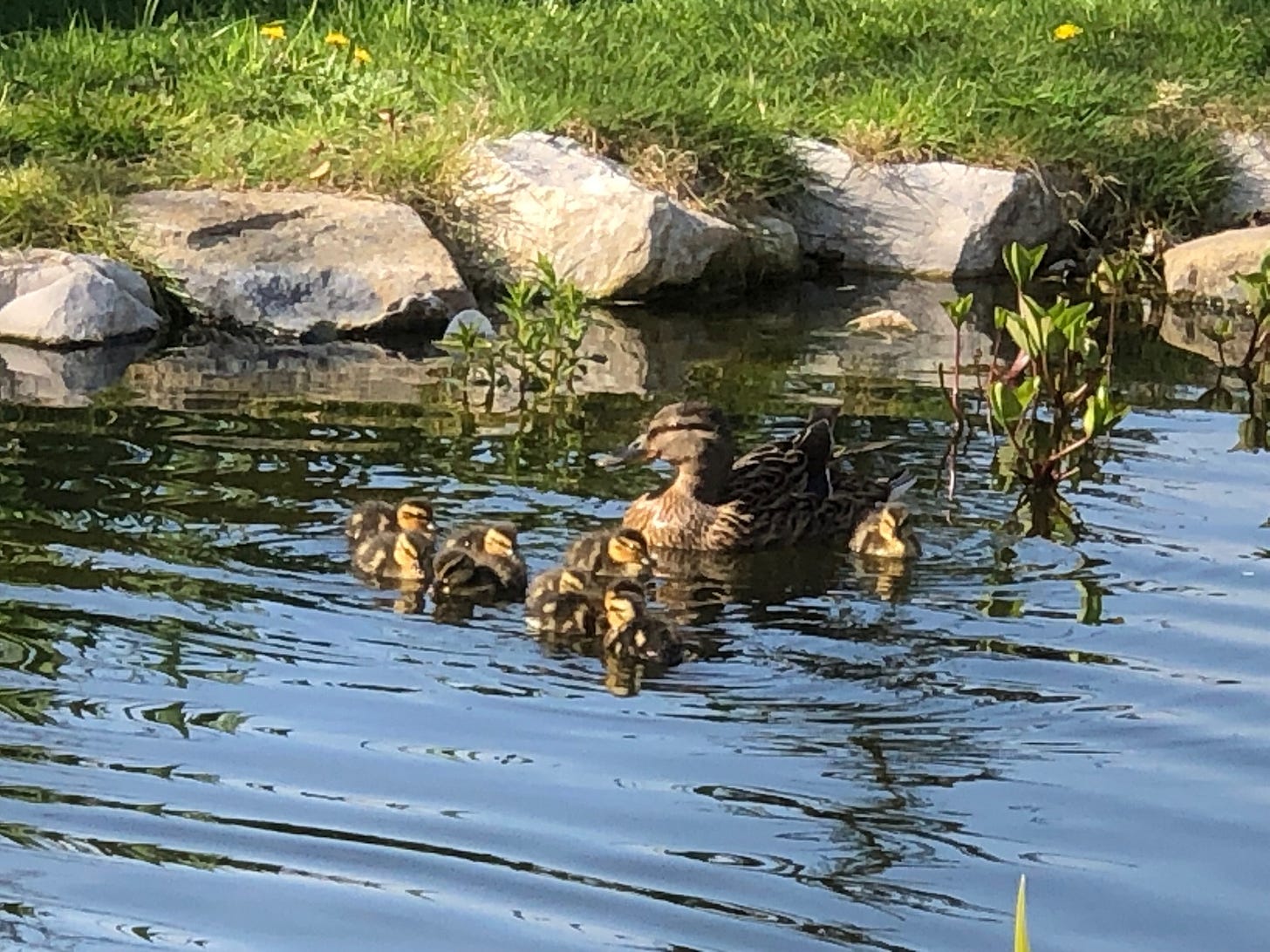
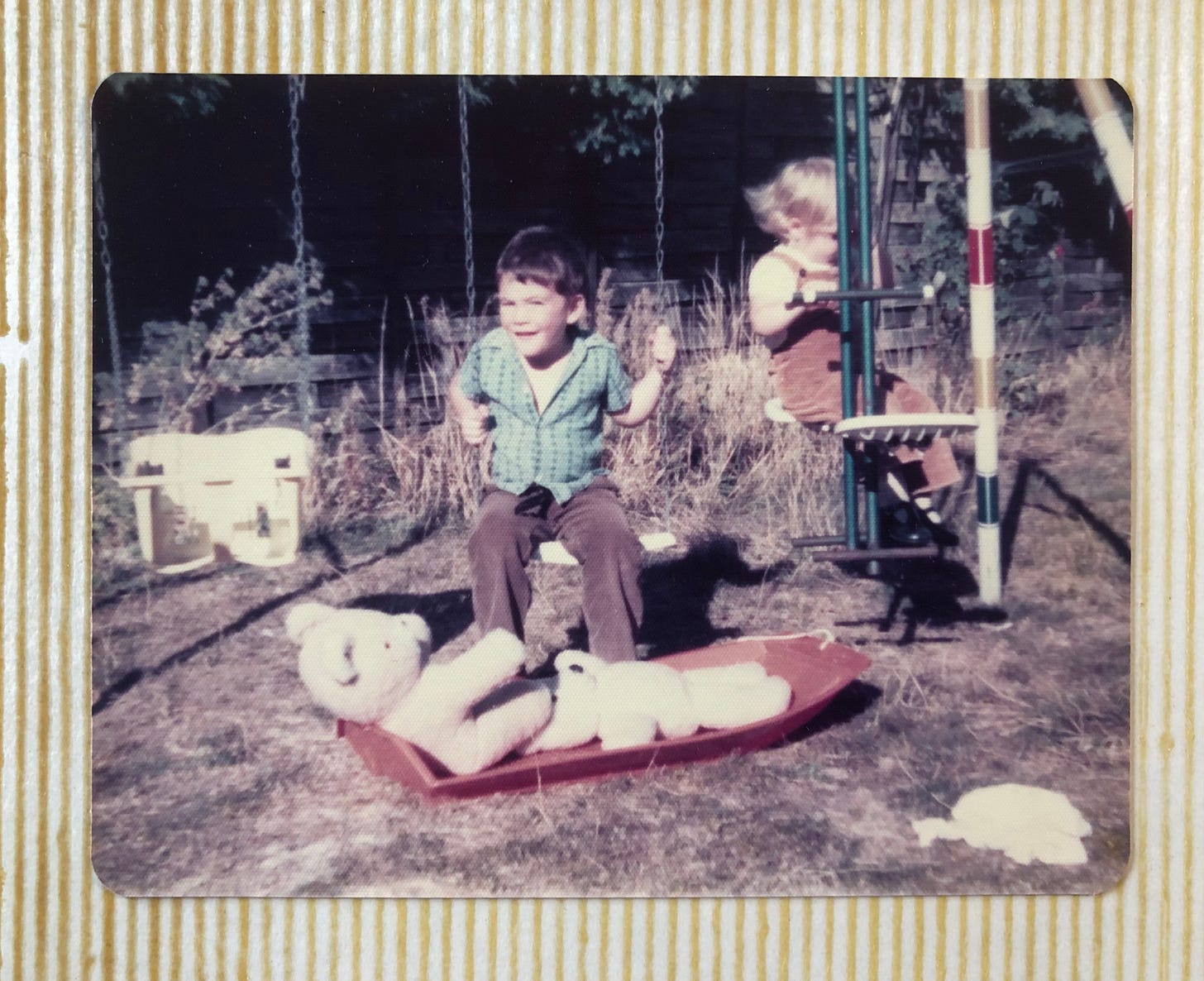


IMPORTANT POST UPDATE!
The seesaw/teeter-totter debate has been resolved - in words by Jill and an actual picture of me USING one in August 1976, aged nearly two! Do have a look - scroll down to the bottom of the post!
TBH, my heart was in my mouth for Mrs. Duck. Thrilled to see the featherlings cuddled together.
Very very sweet.
Surely Terry will approve...